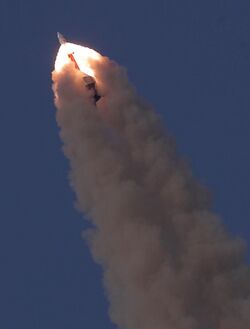Engineering:ISRO Pad Abort Test
 | |
| Mission type | Launch escape system |
|---|---|
| Operator | ISRO |
| Mission duration | 4 minutes, 25 seconds |
| Apogee | 2.75 km (1.71 mi), |
| Spacecraft properties | |
| Spacecraft type | Gaganyaan's boilerplate vehicle |
| Manufacturer | ISRO |
| Launch mass | 12.6 ton [1] |
| Start of mission | |
| Launch date | 5 July 2018 |
| Launch site | Satish Dhawan Space Centre |
The ISRO Pad Abort Test was an Indian Space Research Organisation launch escape system test of its crew module as part of Indian Human Spaceflight Programme. The successful test took place on 5 July 2018.[2]
A Pad Abort Test is a trial run for the spacecraft's launch abort system (sometimes called a launch escape system). This system is designed to quickly get the crew and spacecraft away from the rocket in the event of a potential failure. It is similar to an ejection seat for a fighter pilot, but instead of ejecting the pilot out of the spacecraft, the entire spacecraft is "ejected" away from the launch vehicle. The technology developed is expected to be applied to the first Indian crewed spacecraft called Gaganyaan, scheduled to be launched no earlier than 2024.[3]
Flight

The countdown for the test started at 2:00 am (IST) on 5 July 2018. At 7:00 am (IST) The Crew Escape System with crew module successfully lifted-off from Satish Dhawan Space Centre. The crew module was accelerated to 10 g[4] and reached a highest altitude of 2.75 km (1.71 mi), it later safely parachuted down and floated in the Bay of Bengal 2.9 km (1.80 mi) away from its launch site. It was carried skyward using seven solid-fueled rocket motors keeping within the safe g-force limits. Later recovery boats were sent to recover the crew module. The total duration of the test mission was 259 seconds. The test launch process was recorded by around 300 sensors.[5][6] Main objectives of test were nominal 20 second ascent and 200 seconds of descent, not including the splashdown.[7] Chute detachment was a scheduled event occurring around 259.4 seconds after launch as intended.[8][9]
| Time | Event |
|---|---|
| T0 - 30 minutes | Grid fins deployed |
| T0 - 8 seconds | Separation from launchpad |
| T0 | Ignition of High Altitude Escape Motor (HEM) and Low Altitude Escape Motor (LEM) |
| T0 + 0.9 seconds | Ignition of Pitch Motor (PM) |
| T0 + 2 seconds | Burnout of Pitch Motor (PM) |
| T0 + 5 seconds | Burnout of High Altitude Escape Motor (HEM) |
| T0 + 8 seconds | Burnout of Low Altitude Escape Motor (LEM) |
| T0 + 18 seconds | Crew Escape System/Crew Module aft link separation |
| T0 + 20 seconds | Crew Escape System/Crew Module separation, jettisoning motor ignition |
| T0 + 29 seconds | Parachute deployment |
| T0 + 265 seconds | Crew Module Splashdown. |
See also
- Gaganyaan, India's crewed spacecraft
- Indian Human Spaceflight Programme
- Launch escape system
References
- ↑ "Parliamentary Q&A [25 Nov 2016: Queries on Crew Escape System, Chandrayaan-2 rover and MOM-2"]. 25 November 2016. https://www.reddit.com/r/ISRO/comments/5et61z/parliamentary_qa_25_nov_2016_queries_on_crew.
- ↑ "ISRO conducts pad abort test for Indian human space flight program – NASASpaceFlight.com" (in en-US). 4 July 2018. https://www.nasaspaceflight.com/2018/07/isro-pad-abort-test-indian-human-program/.
- ↑ "Gaganyaan mission can't happen this year or next year, focus fully on safety aspects: Isro chief". The Times of India. 2022-06-30. ISSN 0971-8257. https://timesofindia.indiatimes.com/india/gaganyaan-mission-cant-happen-this-year-or-next-year-focus-fully-on-safety-aspects-isro-chief/articleshow/92579979.cms.
- ↑ Baluragi, Hanamantray; Suresh, Byrana Nagappa (2020), "Indian Space Program: Evolution, Dimensions, and Initiatives" (in en), Handbook of Space Security (Cham: Springer International Publishing): pp. 1–19, doi:10.1007/978-3-030-22786-9_38-2, ISBN 978-3-030-22786-9, http://link.springer.com/10.1007/978-3-030-22786-9_38-2, retrieved 2020-07-04
- ↑ "ISRO's first 'pad abort' test, critical for future human space mission, successful". https://www.thehindu.com/sci-tech/technology/isros-first-pad-abort-test-successful/article24336860.ece.
- ↑ "SUCCESSFUL FLIGHT TESTING OF CREW ESCAPE SYSTEM - TECHNOLOGY DEMONSTRATOR - ISRO" (in en). https://www.isro.gov.in/hi/update/05-jul-2018/successful-flight-testing-of-crew-escape-system-technology-demonstrator.
- ↑ "ISRO's Human Space Programme: Pad Abort Test (PAT) on 5th July, 2018 Early Morning". 4 July 2018. http://www.sac.gov.in/SacSliderI_Repository/Vyom/English/585/SSAA_HSP-PAT-CES-FLASH_2July2018.pdf.
- ↑ "Episode 80 - S Somnath Director of Vikram Sarabhai Space Centre" (in en-GB). 2018-11-30. https://astrotalkuk.org/episode-80-s-somnat-director-of-vikram-sarabhai-space-centre/.
- ↑ "Flight test of crew escape system - Technology Demonstrator Lift of video - ISRO". https://www.isro.gov.in/flight-test-of-crew-escape-system-technology-demonstrator-lift-of-video.
- ↑ Kunhikrishnan, P. (15 Feb 2019). "Recent Indian Space Missions: Update as of February 2019". http://www.unoosa.org/documents/pdf/copuos/stsc/2019/tech-25E.pdf.
External links
 |
